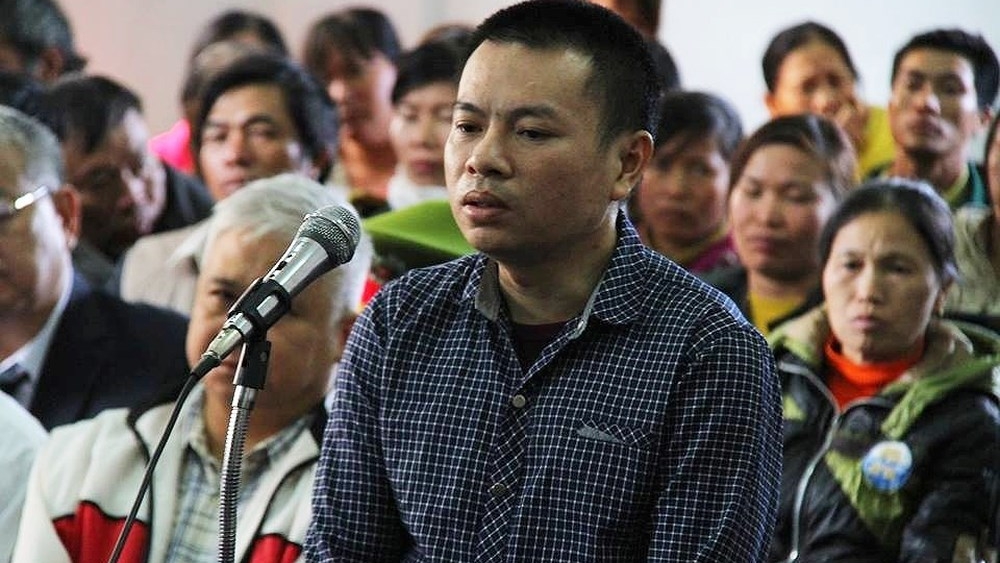Mobilisez -vous pour Hien, paysan condamné à mort

[English version below]
Le 3 janvier 2018, le Tribunal populaire de la province de Dak Nong, dans le Sud du pays, a condamné Dang Van Hien à la peine de mort pour meurtre, en vertu de l’article 93 du code pénal vietnamien.
Le 12 juillet 2018, sa peine a été confirmée en appel par la Cour populaire suprême de Ho Chi Minh Ville. Ni le tribunal de première instance ni la cour d’appel n’ont accepté de prendre en compte l’existence de circonstances atténuantes, pourtant nombreuses. Pas moins de sept circonstances atténuantes prévues par le code pénal vietnamien sont applicables dans son cas, et auraient dû aboutir à une réduction de sa peine : une situation de légitime défense (Article 46, clause 1.c), faisant suite à des actes illicites perpétrés par les victimes (1.e), la reddition de Dang Van Hien (1.n) et son aveu de culpabilité (1.o). Le refus des tribunaux vietnamiens de prendre en compte ces circonstances atténuantes s’apparente à un véritable déni de justice.
En 2005, Dang Van Hien, issu de la minorité ethnique Nung, achète des terres dans la Province Dak Nong, afin d’y établir une plantation de noix de cajou et de café. Deux ans plus tard, le gouvernement local attribue à l’entreprise de développement Long Son 1000 hectares de terres, dont les limites sont mal définies et qui empiètent sur les propriétés de plusieurs fermiers, dont Dang Van Hien. En février 2008, des employés de Long Son se rendent sur les terres de Dang Van Hien et d’autres fermiers avec des bulldozers, armés de matraques et de gaz lacrymogène, détruisent une partie de leurs plantations et blessent plusieurs personnes. Après une pétition des fermiers auprès du gouvernement central vietnamien, les intimidations orchestrées par l’entreprise cessent. Mais à partir de 2011, Dang Van Hien et ses voisins sont à nouveau victimes de menaces et d’attaques répétées détruisant leur moyen de subsistance, et ce dans une impunité totale.
Le 23 octobre 2016, alors qu’une dizaine d’employés de Long Son se rend à nouveau sur son domaine, Dang Van Hien fait appel à ses voisins pour se protéger. Il s’arme d’un pistolet et tente de faire fuir les agresseurs en tirant un coup en l’air, en vain. Ces derniers se mettent à jeter des pierres sur sa maison, obligeant Dang Van Hien à se retrancher avec sa femme et son fils de 3 ans dans leur grenier. Rejoint par des voisins, ils repoussent finalement les employés de Long Son et font trois victimes dans la fusillade. Après quelques jours de cavale, Dang Van Hien se rend à la police, avec deux de ses voisins. Ces derniers seront eux condamnés à des peines de prison.
Vous voulez soutenir Dang Van Hien ?
- Téléchargez ce modèle de lettre, personnalisez-la avec vos coordonnées et adressez-la au Président du Parquet populaire suprême.
- Partagez : Tweetez, postez sur Facebook, faites le savoir autour de vous !
Contexte
Les errements de la justice vietnamienne
Le cas de Dang Van Hien souligne les nombreux manquements de la justice vietnamienne. Au Vietnam, régime autoritaire à parti unique, le système judiciaire est contrôlé par le Parti Communiste Vietnamien (PCV), au pouvoir sans interruption depuis 1976. Les juges et les procureurs sont tous membres du Parti. Bien que la Constitution garantisse en théorie leur indépendance, ils sont sélectionnés par le PCV, qui vérifie leur « fiabilité » politique en amont.
Dans ce contexte, il n’est pas étonnant que le choix des peines prononcées par les tribunaux soit éminemment arbitraire. Tous les chefs d’accusation pouvant aboutir à une condamnation à mort, au nombre de 18 au Vietnam, proposent des peines de prison alternatives. Les tribunaux sont tenus de prendre en compte les circonstances atténuantes, ce qui leur permet en théorie de pouvoir dispenser des peines alternatives moins sévères.
Les condamnations injustifiées de ce type partagent très souvent des caractéristiques semblables. Tout d’abord, elles ont lieu dans des zones rurales. Les prévenus et leurs familles sont pour la plupart pauvres, sans ou très peu d’éducation, et ne disposent pas d’un réseau de relations pouvant leur venir en aide. Très souvent, les accusés sont confrontés à des violences policières lors de leur détention provisoire, voire de la torture, et sont ainsi contraints de passer aux aveux. La plupart du temps, ils ne bénéficient pas d’une aide juridique. Pire, les sentences sont prononcées à la va-vite, se basant sur des éléments de preuve inexistants ou insuffisants. L’ensemble de ces éléments constituent des manquements au droit à une procédure équitable.
Miscarriage of justice in death penalty case
For the first time, a Vietnamese farmer has been sentenced to death in a land rights case. Despite numerous extenuating circumstances, Dang Van Hien’s conviction was upheld on appeal.
On 3 January 2018, the People’s Court of Dak Nong province, in Southern Vietnam, sentenced Dang Van Hien to death penalty for murder, according to Article 93 of the Penal Code.
On 12 July 2018, his sentence was upheld on appeal by the People’s High Court of Ho Chi Minh City. Both the trial court and the appeal court refused to consider the extenuating circumstances. Several mitigating factors made available by the country’s Penal Code should have been considered by the courts : legitimate defense (Article 46, Clause 1. c), the fact that Dang Van Hien was incited by illegal acts of the victims (1.e), he turned himself in (1.n) and made honest declarations (1.o), among others. Had these extenuating circumstances been taken into consideration, Dang Van Hien would not be facing death penalty. The criminal procedures were not correctly followed by the lower courts and the prosecutorial bodies, leading to a death penalty unjustly imposed on Dang Van Hien. The fact that both courts refused to do so is nothing short of a denial of justice.
In 2005, Dang Van Hien purchased some land in Dak Nong province to plant cashew and coffee for a living. Two years later, the People’s Committee of Dak Nong assigned 1.000 hectares of forest land to agroforestry development company Long Son Co. The area was not accurately surveyed and overlapped with parcels belonging to neighbouring farmers, including Dang Van Hien. In February 2008, Long Son Co. employees with bulldozers trespassed on Hien’s land, armed with batons and tear gas, and destroyed two hectares of crops. After some farmers petitioned to the central government, intimidations from the agroforestry company stopped. From 2011, Dang Van Hien and his neighbours started being targeted once again, with threats and repeated attacks that destroyed their livelihood, in full impunity.
On 23 October 2016, Dang Van Hien was at home when he saw a dozen employees from Long Son Co. coming on his lands. After calling some of his neighbours for help, he took a gun and fired a warning shot into the sky to try and fend off the attackers, in vain. The employees started throwing rocks at him, leading Hien to retreat in his attic with his wife and 3 year old son. With the help of other farmers, he managed to push back the attackers and kept firing shots aimlessly, killing three Long Son Co. employees and leaving a dozen injured. After a few days spent as fugitives, Dang Van Hien and two of his neighbours turned themselves in. The latter two were handed jail sentences.
ACAT-France sent an open letter to the Vietnamese authorities asking that they initiate a trial of cassation for Mr. Dang Van Hien and encourages its members to do the same.
Context
Infringement of the right to a fair trial
Dang Van Hien’s case underlines the many failures of Vietnam’s justice system. In Vietnam, a one-party authoritarian state, the judiciary system is controlled by the Communist Party of Vietnam (CPV), which has been in power since 1976. Judges and prosecutors are all members of the CPV. Despite the Constitution theoretically guaranteeing their independence, they are selected by the PCV and « vetted » for political reliability.
In this context, it is not surprising that the decisions made by Vietnamese courts are extremely arbitrary. For all the offences punishable by death – 18 in total – the Criminal Code does not impose mandatory death penalty and explicitly states alternative penalties, e.g. life imprisonment. Courts are instructed to take into account extenuating circumstances in sentencing, providing them with the discretion to resort to less severe alternatives.
Wrongful convictions and miscarriage of justice almost always share similar characteristics. First, they mostly happen in rural areas. The defendants and their families are often poor, with little or no education, and do not have a network of relations who can help them. Very often, the accused find themselves victims of police brutality and even torture during pre-trial detention, and are forced to confess. Most of the time, they do not have access to legal assistance. Sentences are hastily delivered and are based on deficient or insufficient evidence. All those elements underline how Vietnam’s justice system fails to uphold the defendants’ right to a fair trial.



